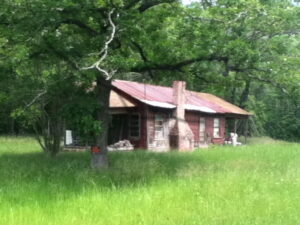Growing up in Sabine County in the fifties was a wonderful adventure. One of the greatest pleasures was camping out on the banks of the Sabine River, or one of the many creeks which feed it. This was real camping out. No motor homes or travel trailers in those days. Dad’s group had a small Army surplus tent which was sometimes used, but mostly it was an open air bed on an Army surplus cot, if you were lucky. There was a cranky generator which required about a half-dozen 100 watt light bulbs to operate properly. If they used fewer, the bulbs would burn out. At any rate, sleep was secondary. Much of the night was spent “running” the throw lines and bank set hooks. Catfish were the prey, and usually enough were caught to feed the camp and take a bit home. Occasionally, something would destroy one of the sets, and embellish the persistent rumor that giant catfish lived in those waters. More likely, a big Loggerhead Turtle or Gar was the culprit.
One member of the group was a man who had no visible means of support and could usually be found loitering around the Court House. Let’s call him Jethro, mainly because I never knew anyone named Jethro, and I don’t want to embarrass any of his family. Jethro’s contribution to the group was as camp cook, and for the most part, he was competent. On one occasion, the group had been quite successful and decided to have a fish fry at the camp. Jethro prepared a huge mound of cornmeal battered fish and the men gathered round for the feast. My father bit into a piece and was unable to swallow it.
“Jethro”, he exclaimed, “why is this fish so salty? We can’t eat this?” Jethro looked puzzled, picked up the box of salt, and after studying it for a bit, said “Well, Floyd, this ain’t my usual brand of salt.”
A camp culinary mainstay was a dish called Slumgullion. Slumgullion had its origin in the Hobo camps of the thirties, and consisted of whatever the men had, all thrown into a pot and shared. There is no recipe for it, it’s strictly catch as catch can. By the fifties, a basic recipe of sorts had evolved. These men were far more prosperous than the homeless men who rode the rails in the thirties, so a bit of care was taken in selecting ingredients to make the stew. I liked it, not only because it always tasted good, but because it was never the same twice in a row. Today, more that 80 years after its creation in Hobo camps, it survives as Cowboy Soup, and tastes better than ever. In fact, I had a bowl of leftover Slumgullion, with a Latin flavor, for breakfast this morning.
Slumgullion or Cowboy Soup Basic Recipe meat (can be ground, or chopped into small pieces) onion garlic salt pepper tomatoes (canned or fresh. chopped is best) 4 or more different vegetables, canned or fresh water Throw it all in a pot and cook until done.

